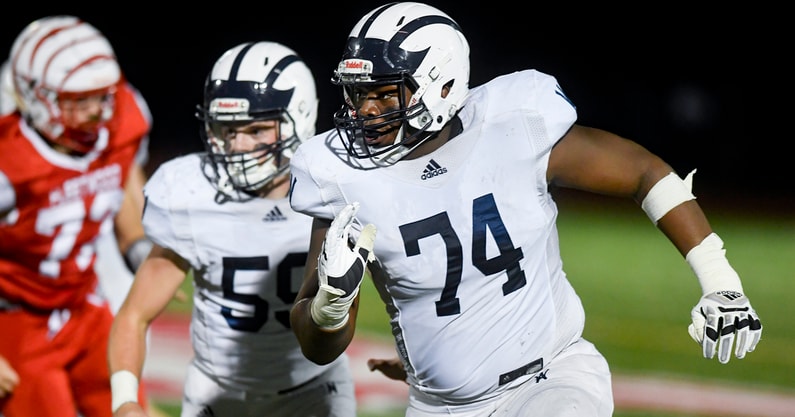Plan in place for Pennsylvania high school student-athletes to profit from NIL

NIL is one step closer to becoming a reality for high school student-athletes in Pennsylvania.
The Pennsylvania Interscholastic Athletic Association board of directors approved on first reading a policy to allow student-athletes to profit off their NIL.
The proposal – which still requires two more readings before it can become official – would allow student-athletes to obtain commercial endorsements and earn money from promotional activities, including a social media presence. The policy mirrors the 13 other states across the country where NIL is allowed for high school student-athletes.
“We really need to probably get ahead of this and address it and put some parameters in place to guide students and their families so that they’re educated, and they know what they’re getting into,” PIAA Assistant Executive Director Melissa Mertz said.
For example, NIL is currently allowed for high school student-athletes in Alaska, California, Colorado, Connecticut, Kansas, Louisiana, Maine, Minnesota, Nebraska, New Jersey, New York, North Dakota and Utah. Over the past few months, Louisiana, Minnesota and North Dakota joined the list of states that allow their student-athletes to participate in NIL without jeopardizing their eligibility. However, most high school associations – including major states like Texas, Florida and Georgia – have prohibited student-athletes from participating in NIL.
Proposed policy does come with restrictions
Nonetheless, the policy does come with some restrictions. According to a review of the proposal, student-athletes can’t reference the PIAA, member schools or team names. They also can’t wear their school uniform in connection with NIL activities.
Also, the policy says booster clubs, coaches and alumni can’t negotiate or pay for NIL deals. This has been a sticking point with other high school athletic associations across the country. Some leaders – including in Ohio where NIL discussions were tabled earlier this summer – believe it could lead to schools influencing athletes to transfer schools.
The PIAA also listed products and services students are prohibited from endorsing. That list includes:
- Adult entertainment
- Alcohol
- Controlled substances
- Opioids
- Casinos and gambling
- Weapons, firearms and ammunition
“The proposed Pennsylvania policy essentially mirrors the high school NIL policy in neighboring New Jersey,” said Dan Greene, a NIL expert and associate attorney at Newman & Lickstein in Syracuse, N.Y.
“It mainly has the same prohibitions and restrictions on NIL activities. It includes no use of school logos and uniforms in NIL activities, athletes being unable to engage in NIL activities during school activities, and schools being prohibited from facilitating deals.”
Even with the similarities, there are a few differences, Greene said.
“Pennsylvania also follows states like New Jersey and Connecticut by listing certain categories of products and services that athletes cannot engage with for NIL activities, which makes their policy a bit more restrictive than states like New York that do not put a restriction on certain industries,” he said. “However, Pennsylvania, unlike New Jersey and Connecticut, has not included tobacco and nicotine-related products nor cannabis products in its current list of prohibited categories. Tobacco and cannabis could be added to the list later on. Especially, since the policy needs to pass through two more readings before becoming official.”
What’s next for Pennsylvania NIL?
The PIAA said there must be two more readings of the policy before it becomes official, which probably won’t happen until July 2023.
Top 10
- 1Breaking
Florida tops Houston
Gators are champs
- 2New
Predicting Final AP Poll
Projected Top 25 after Florida crowned
- 3Hot
Way-Too-Early Top 25
Looking ahead to 2025-26 hoops
- 4
Jay Bilas
Calls out ACC in defense of Duke
- 5
Mouhamed Dioubate
Alabama transfer commits to Kentucky
Get the On3 Top 10 to your inbox every morning
By clicking "Subscribe to Newsletter", I agree to On3's Privacy Notice, Terms, and use of my personal information described therein.
Additionally, the organization also said it is hiring a company to navigate this new world, educating athletes about implications such as tax laws and protecting them against being taken advantage of by companies.
Even though NIL failed in Ohio, for now, Mertz told the Pittsburgh Post-Gazette it looks like it’s on track to become a reality in Pennsylvania.
“We felt they wrote a pretty complex policy that maybe wasn’t easy to understand,” Mertz told the Post-Gazette. “I think maybe that’s the reason that didn’t pass. We looked strongly at New Jersey and New York. … In the state association business, we do that often. Kind of borrow and steal and help each other out that way.”
The NJSIAA passed regulations allowing athletes to profit beginning on Jan. 1, 2022. Students are prohibited from referencing NJSIAA or using school logos in endorsements. Specific categories, like those in the PIAA proposal, are not permitted.
The NYSPHSAA changed its rules in October 2021 to allow student-athletes to turn a profit on their NIL. Athletes can’t appear in their school uniform in any endorsement.
Pennsylvania athletes could cash in
Furthermore, Pennsylvania annually is home to some of the top high school football and basketball players in the country. Plus, it’s also a hotbed for athletes in other sports like women’s basketball, soccer and lacrosse.
Currently, two Pennsylvania high school student-athletes have massive On3 NIL Valuations. West Virginia four-star receiver commit Rodney Gallagher out of Uniontown Laurel Highlands has an On3 Valuation of $253,000. Plus, four-star Penn State OL pledge Jven Williams of Reading Wyomissing has a NIL value of $139,000.
Overall, nine of the top 12 football recruits in the state have an On3 NIL Valuation of more than $20,000. The On3 NIL Valuation is an index that looks to set the standard market value for both high school and college-level athletes. The NIL valuation does not act as a tracker of the value of NIL deals completed to date. It rather signifies an athlete’s value at a certain moment in time.